Religion: Religious Leaders Post-1900
Trevor Huddleston (1913-1998)
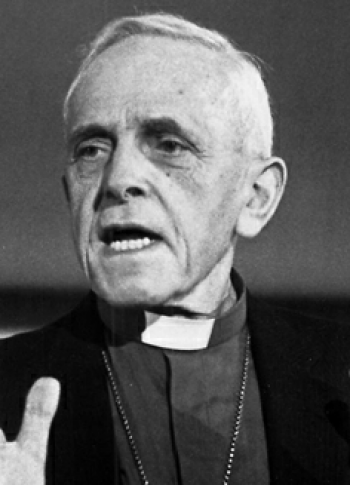
Religion and Branch: Christianity (Anglican)
Title: Archbishop
Born in Bedford, England, Trevor Huddleston was a prominent Anglican bishop and anti-apartheid activist. His religious and activist roles, though prominently expressed in South Africa, had a profound influence on perceptions and actions regarding apartheid in the United Kingdom (UK). In 1937, he was ordained as a priest of the Anglican religious order called the Community of the Resurrection. His ecclesiastical career saw him take on roles as the bishop of Stepney in London, bishop of Masasi (Tanzania), bishop of Mauritius, and archbishop of the Indian Ocean.
Living in South Africa from 1943 to 1956 deeply influenced Huddleston's perspective on racial injustice. He was stationed in the Johannesburg township of Sophiatown, where he witnessed firsthand the brutal realities of apartheid. He became an outspoken critic of the system, which put him at odds with the South African government.
Upon his return to the UK, Huddleston became a key figure in raising awareness about the injustices of apartheid. He was involved in the establishment of the Anti-Apartheid Movement in 1959, which played a crucial role in mobilizing British public opinion against apartheid. Huddleston's activism earned him various honors. In the UK, he was well-regarded for his principled stand against racial discrimination, and his efforts were pivotal in shaping the UK's public stance on apartheid.
Huddleston's commitment to social justice, driven by his religious convictions, made him a symbolic figure both in the UK and internationally. He is often remembered for his famous quote regarding apartheid: "I have seen the future of South Africa, and the future is black." While Huddleston's most notable activities against apartheid took place in South Africa, his influence in the UK was profound. He used his religious platform to champion the cause of racial justice and played a vital role in shaping British opposition to apartheid.
Gyani Sundar Singh Sagar (1917-1996)
Religion and Branch: Sikhism
Title: Preacher, Writer
Gyani Sundar Singh Sagar, commonly known as Gyani Ji, was a prominent Sikh figure in the United Kingdom (UK), known for his contributions to the Sikh community's growth and cohesion in the country. Recognizing the multicultural fabric of the UK, he engaged in interfaith dialogue, promoting understanding and mutual respect among diverse religious communities.
Sagar served as a religious leader for the Sikh community in the UK, providing guidance, leading prayers, and offering spiritual teachings. His deep knowledge of Sikh scriptures and traditions was greatly revered. As the Sikh community in the UK grew, particularly during the 1960s and 1970s with increased migration from India, Gyani Sundar Singh Sagar played a crucial role in helping to establish and support Gurdwaras (Sikh places of worship) and community centers.
Sagar advocated for the rights and recognition of Sikhs in the UK. He worked towards ensuring that Sikhs could freely practice their faith and customs, including wearing the turban and kirpan, which are integral aspects of Sikh religious identity. Beyond just religious rites and ceremonies, Sagar focused on educating the younger generation of Sikhs about their heritage, history, and religious principles. He believed that knowledge was key to preserving and strengthening the Sikh identity in the diaspora.
Sagar was a pivotal figure in the Sikh community in the UK. He worked tirelessly to ensure the growth, unity, and prosperity of the Sikh community, all while promoting a spirit of understanding and coexistence with other religious communities in the country.
Lionel Blue (1930-2016)
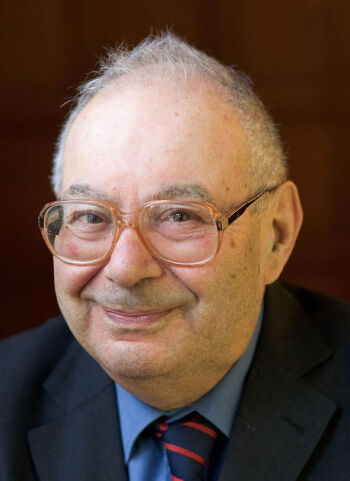
Religion and Branch: Judaism
Title: Rabbi, Broadcaster, Journalist, Author
Lionel Blue was a British Reform rabbi who became a well-known public figure in the United Kingdom (UK). As the first openly gay British rabbi, his candidness about his sexuality at a time when it was much less accepted in religious circles was groundbreaking.
Given his personal experiences, Blue became an advocate for LGBTQ rights and acceptance within religious communities. His openness about his own journey helped many others navigate the intersection of religious faith and sexual orientation.
As a Reform rabbi, Blue was involved in progressive Jewish thought and practices in the UK, advocating for a more inclusive and modern approach to Jewish teachings and traditions.
Rabbi Blue was best known to the British public for his regular appearances on BBC Radio 4's "Thought for the Day" segment on the Today program. His gentle humor, wit, and relatable approach to discussing spirituality and daily life endeared him to many, regardless of their faith or beliefs. He also authored several books that combined spirituality, humor, and personal anecdotes. These works appealed to a wide audience, both within and outside the Jewish community.
Rabbi Blue was a proponent of interfaith dialogue and understanding. He often engaged in discussions with representatives from other religious communities, promoting tolerance and mutual respect. His unique blend of humor, personal vulnerability, and spiritual insight made him resonate with a wide audience. He played a pivotal role in advancing discussions about sexuality in religious contexts and promoting interfaith dialogue.
Ajahn Sumedho (1934 to Present)
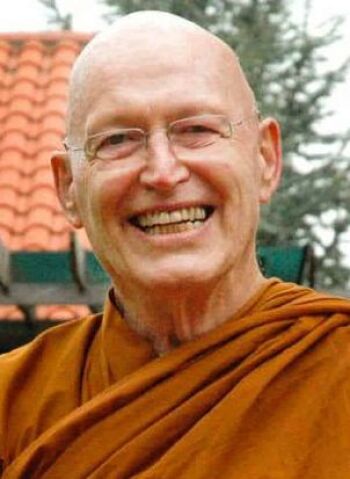
Religion and Branch: Theravada Buddhism (Thai Forest Tradition)
Title: Monk, Educator
Ajahn Sumedho, born Robert Karr Jackman, is a prominent figure in the Theravada Buddhist tradition, particularly within the Thai Forest Tradition. Born in Seattle, Washington, he served in the United States Navy before attending the University of California, Berkeley. He later traveled to Asia, where he trained under the renowned Thai meditation master Ajahn Chah and was ordained in 1967.
Sumedho is credited with playing a pivotal role in introducing the Thai Forest Tradition of Theravada Buddhism to the West, particularly in the United Kingdom (UK). Under his guidance, several monasteries and meditation centers affiliated with this tradition have been established.
In the late 1970s, Sumedho was instrumental in establishing a monastic community in the West. Responding to interest from the UK, he and a group of monks established the English Sangha Trust's invitation, which later evolved into Amaravati Buddhist Monastery in Hertfordshire and Cittaviveka Buddhist Monastery in West Sussex.
Sumedho's teachings emphasize the practice of mindfulness and meditation, drawing from the Thai Forest Tradition. Ajahn Sumedho has written several books and given numerous talks, many of which have been instrumental in making Theravada Buddhist teachings accessible to Western audiences.
Even after his retirement from administrative duties, Sumedho's influence continues. Many Western monks and nuns trained under him or within the monastic institutions he helped establish, ensuring the continuation of his teachings and the Thai Forest Tradition in the West. He remains a revered and influential figure in the Theravada Buddhist community in the UK and beyond.
William Henry Hugo Newman-Norton (1948 to Present)
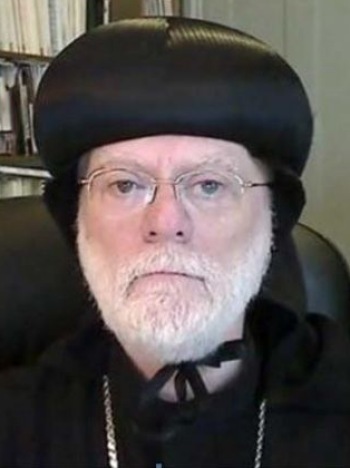
Religion and Branch: Christianity (Oriental Orthodox)
Title: Metropolitan
William Henry Hugo Newman-Norton, known by the religious name Abba Seraphim, is a significant figure in the British Orthodox Church, which is a small Orthodox jurisdiction within the United Kingdom (UK). He holds the title of metropolitan of Glastonbury, a position of prominence within the British Orthodox Church.
Abba Seraphim has been a key leader in the British Orthodox Church, a jurisdiction that originally was in communion with the Coptic Orthodox Church of Alexandria. He has played a significant role in guiding its spiritual and administrative affairs. Abba Seraphim is known for his scholarship on Orthodox Christianity, contributing articles, essays, and books on theological and ecclesiastical topics. His works often focus on the traditions, liturgy, and history of the Orthodox Church.
In 1994, under Abba Seraphim's leadership, the British Orthodox Church entered into communion with the Coptic Orthodox Church of Alexandria, thus reintegrating with the wider Oriental Orthodox communion. However, in 2015, the British Orthodox Church decided to become independent again, ending its formal ties with the Coptic Church.
Abba Seraphim has been active in promoting interfaith dialogue and understanding, engaging with leaders and communities from different religious traditions in the UK. He is a prominent figure in the British Orthodox Church, contributing to its spiritual, theological, and administrative dimensions. He has played a crucial role in shaping the church's relationship with the broader Orthodox world and promoting interfaith dialogue in the UK.
Rowan Williams (1950 to Present)
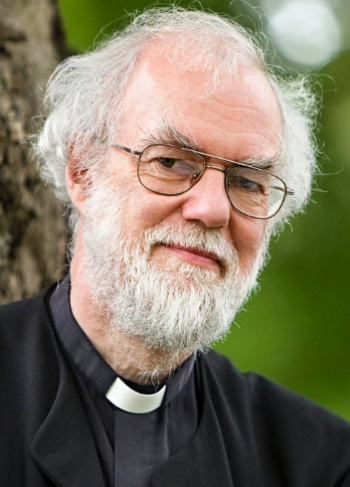
Religion and Branch: Christianity (Anglican)
Title: Archbishop of Canterbury, Theologian
Rowan Williams is a prominent figure within the Christian religious landscape of the United Kingdom (UK). He served as the 104th archbishop of Canterbury, the senior bishop and principal leader of the Church of England, from 2002 until his retirement in 2012. Since retiring, he took the position of master of Magdalene College at the University of Cambridge, continuing his academic and theological work.
As the archbishop of Canterbury, Williams was the spiritual leader of the worldwide Anglican Communion, which includes millions of members in more than 165 countries. Throughout his tenure, Williams engaged with a wide array of social and political issues, from economic inequality and climate change to the role of religion in public life. He often emphasized the importance of interfaith dialogue and understanding. Williams also faced challenges during his tenure, especially regarding issues such as the ordination of gay bishops and women bishops. His approach was often characterized by a desire for unity and dialogue within the Anglican Communion.
Williams is a renowned theologian and has written extensively on various theological, social, and cultural topics. His scholarly work spans subjects such as Christian theology, spirituality, and the intersection of religion with contemporary society. Williams is known for his commitment to fostering dialogue between different religious communities. He has often spoken about the importance of understanding between Christianity and other world religions, notably Islam.
Williams is a significant figure in the religious landscape of the UK, not only for his leadership of the Church of England and Anglican Communion but also for his scholarly contributions and his engagement with contemporary social, cultural, and political issues.
Julia Neuberger (1950 to Present)
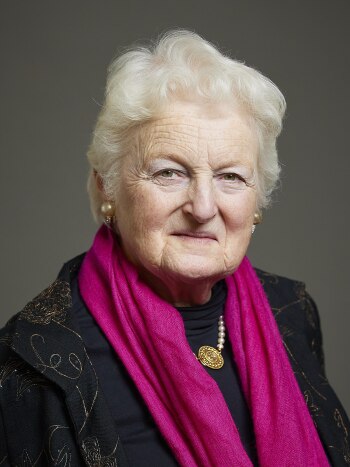
Religion and Branch: Judaism (Reform)
Title: Rabbi, Broadcaster, Writer
Julia Neuberger is a prominent figure within the Jewish community in the United Kingdom (UK) and has played an influential role in wider British society. In 1977, she became one of the country's first female rabbis when she was ordained at Leo Baeck College. She served as rabbi of South London Liberal Synagogue from 1977 to 1989 and West London Synagogue from 2011 until her retirement in 2020.
Rabbi Neuberger has a prolific career as a broadcaster and writer. She has written on various subjects including Judaism, health care, and end-of-life issues. Neuberger has been a prominent advocate on social issues, including healthcare and the rights of the elderly. She's been involved in several committees and organizations focusing on healthcare ethics, including end-of-life care.
In 2004, Rabbi Neuberger was made a life peer, taking the title baroness Neuberger of Primrose Hill. As a member of the House of Lords, she's been actively involved in debates on health and social care issues. She chaired a review on the death certification process in England and Wales, which led to significant reforms.
Rabbi Neuberger has been a significant figure in the religious and social landscape of the UK, not only for her leadership within the Jewish community but also for her contributions to public life, healthcare ethics, and social issues.
Copyright © 1993—2024 World Trade Press. All rights reserved.

 United Kingdom
United Kingdom